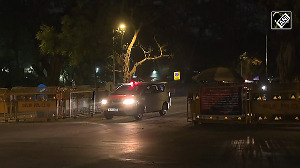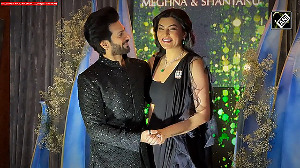August 7 marks a month since the Indian embassy in Kabul was attacked. Aziz Haniffa mourns the death of Venkat Rao, a star of the Indian Foreign Service, in that attack
Many of us in the Washington, DC area who had the good fortune to enjoy the friendship of Vadapalli Venkateshwara Rao -- just 'Venkat' to all of us -- and his charming, highly cerebral wife Malathi, when he was posted to the Indian embassy here as counsellor (commerce), 2003-2005, feel a sense of profound shock and sadness in the wake of his death in the suicide attack on the Indian embassy in Kabul July 7.
To me, his passing is a personal loss; we had become quite close as we shared mutual friends from his earlier posting in my birthplace, Colombo, and we have spent long evenings talking of the time he spent in Sri Lanka. He often said it was one of the most fabulous assignments he'd experienced, and the most enjoyable. And just maybe, we were also drawn to each other by virtue of celebrating our birthdays just ten days apart, in August.
When you consider that, at 44, he was a rising star in the Indian Foreign Service when his life was cut so tragically, so pointlessly short leaves you numb. He had so much left to do, so much in him to contribute, when an insane act cut him off in his prime.
I recall how, less than two weeks after taking charge in Washington, he sought me out, as new South Asian diplomats invariably seek out any journalist covering the region of their interest. In his case, Venkat also wanted to stay abreast of the situation in Sri Lanka, and to find someone he could reminisce with about that country, discuss the string hoppers, Pittu, Appa, Godamba Roti and other essentials of Sri Lankan cuisine that he had grown addicted to.
He and Malathi had me over to their place on several occasions. They were wonderfully gracious hosts, with a sense of humour and an ability to put guests at ease, and invariably our 'dinners' would extend way past the bedtime of their much-loved children Amulya and Karthik.
They talked of how they had become adept at the baila, Sri Lanka's version of the calypso that marries salsa, rumba and a few other dance forms. Venkat would also talk about his love for an occasional shot of arrack, the alcoholic brew with a kick that rivalled the strongest Appalachian moonshine. I had no idea what I was missing; he would kid me on my being teetotal.
We had a close common friend in senior US diplomat Robert Boggs and his wife Susan, and this led to additional bonding. Bob and Susan had first met the Raos in Kathmandu, where Venkat was posted as First Secretary (Political) after his Colombo stint and where Bob was deputy chief of mission at the US embassy. Bob had also served in Colombo as political counsellor 1990-1993 and later as consul general in Kolkata, so the five of us had plenty of things in common to talk about.
We spent a lot of time with one another -- but as always in the aftermath of senseless tragedy, I find myself lamenting that time was not enough, never enough to appreciate Venkat in all his many facets, and I regret that when opportunity afforded, I didn't snatch more time with a man I now miss, and mourn.
It seems like it was just yesterday that Bob and Susan had me over for a farewell dinner at their Falls Church, Virginia home, for Venkat and Malathi, just a week before they were to leave for Delhi at the completion of Venkat's tenure. I remember it as an enjoyable evening, filled with great conversation, considerable levity, and delectable cuisine.
I am now left with a sense of deep guilt that I didn't keep in touch with Venkat after he left, and I had no idea he had been posted to Kabul. When he left Washington, he was not sure what his next posting would be.
Bob and Susan too are having trouble coming to terms with Venkat's tragic death. Bob, now the South Asia analyst at the State Department's Intelligence and Research Bureau, echoed the sentiments of many here when he said Venkat "epitomised the best of the younger generation of Indian diplomats -- smart and competent of course, but also socially outgoing and skilled in representation.
"We met the Raos in Kathmandu. I didn't have a lot of contact with Venkat in his professional role, since I dealt more with Shyam Saran, but the Raos were probably the most popular younger couple in the large Indian mission.
"This was especially impressive in Kathmandu," he said, "where Indian diplomats are subject to some suspicion. We always enjoyed socialising with them at their home, and found that they had developed an impressive circle of friends and contacts. And, of course, we all spent such enjoyable times with them during their tour of duty in Washington."
Bob spoke for the US diplomatic community when he said it was clear to everyone that Venkat, with Malathi's constant support, was destined for a high-profile diplomatic career; that the brilliant promise of his early years had been tragically cut short by a senseless terrorist act.
Patricia Mahoney, who was chief of the political section at the US embassy in Kathmandu and had thus interacted more professionally with Venkat, said "I remember both Venkat and Malathi as engaging, witty, smart, and -- a quality most appreciated in a small diplomatic circle -- fun to be around."
Mahoney, till recently the South Asia hand at the White House National Security Council, who will shortly join the National Defence University, said, "As a counterpart, Venkat typified all the best qualities of the quintessential diplomat -- helpful, responsive, efficient and knowledgeable. Talented and highly dedicated, he clearly was a rising star. I expected to hear great things about him in the future. Not this!"
Mahoney spoke of her profound sorrow for Venkat's "lovely family, his colleagues in the Indian government, and for all of us who had the short-lived pleasure of knowing and working with him."
Much of Venkat's work was behind the scenes; thus, his substantial inputs into the economic content of bilateral discussions between President George W Bush and Prime Minister Dr Manmohan Singh during the latter's visit to the US in 2005 is not generally known.

He had the knack of going beyond his brief, as manifest in the ease with which he interacted with corporate honchos in the US business sector, particularly during US-India Business Council conferences and discussions. And while it was not part of his mandate, and he had no compulsion to do so, he went out of his way to engage with the Indian-American community in the Washington area, becoming an indispensable element in the Diaspora's regular get-togethers.
No less than 88-year-old community icon Rajan Devadas called to lament his passing, and spoke of how "so full of life he was -- always smiling, so cheerful, so very friendly.
"When I heard the awful news that Monday, I couldn't sleep the entire night," Rajan said. "It's such a great loss to the Indian Foreign Service and also to friends like us and the community, who so much enjoyed his company."
Thank you, Venkat -- you were much admired, much loved, when you were in our midst; you are missed beyond measure, now that the act of a coward has cut you off in your prime.







 © 2025
© 2025